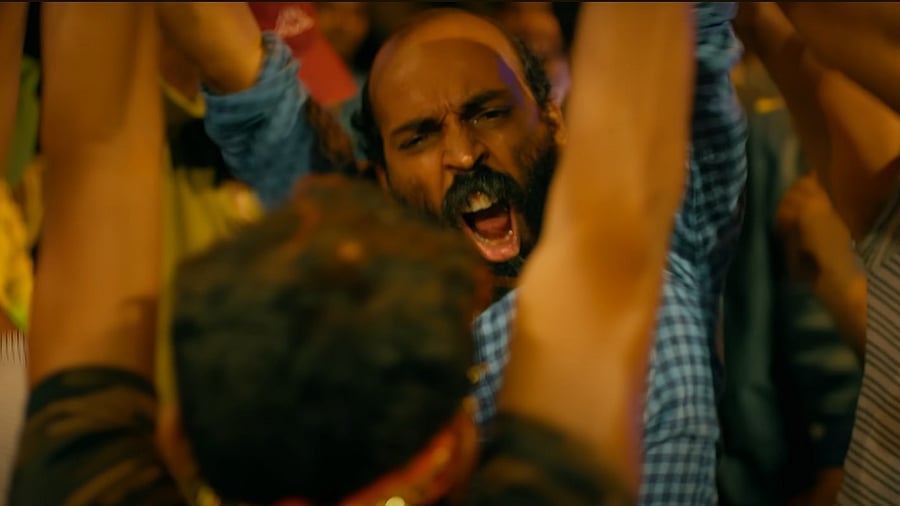
Raj B Shetty in 'Roopanthara'
Credit: Special Arrangement
Bengaluru: It took him about two hours and a cup of coffee in one of the many cafes of Bengaluru to convince the producer of Roopanthara (Transformation), said Mithilesh Edavalath. But the director of possibly the only Kannada film set in a dystopian landscape – and one among a few in Indian cinema – said he cannot take the credit for the visualisation of apocalypse in the film.
"The dystopian world in my initial script was just a barren land," he admitted.
Luckily for him, his cinematographer, Praveen Shriyan took it upon himself to create the 'desolate future' more convincingly.
"We kind of realised that if you go to a barren land, say, a desert in Rajasthan, it will look like it is set in Rajasthan. We did go to a ghost village in Kutch, Gujarat, before realising it is not the place for our film. Then Shriyan suggested VFX – he did all the research, so, in effect, the dystopian world in Roopanthara was created by him," said Edavalath.
With a mere fraction of the budget that Kalki 2898 AD enjoyed, the team nevertheless has managed to evoke a sense of desolation of a dystopian world quite convincingly. Perhaps, it helped that they did not have to use visual effects throughout the film, as Roopanthara cleverly switches to 'past' — our present — a nod to the storytellers revered in our culture, cutting across time.
Edavalath, who moved to Bengaluru from Kerala in 2004, said he did what most people with no film background do — he worked as an assistant director for a couple of years in Malayalam and Kannada films — to understand film-making. By that time, he said he had it all cracked and had a 'pucca potboiler' script in hand. He just needed a producer, the only missing piece in the jigsaw puzzle of a film career.
"Then I watched Raj Shetty's Ondu Motteya Kathe. It was so different from what I see normally in Kannada language movies. Initially, I thought it was produced by 'Lucia' Pawan Kumar. But when I asked around, I learnt it was actually produced by Suhan Prasad, Shetty's friend. As luck would have it, one of my friends knew Suhan," he said.
But Edavalath said he knew he could not approach Suhan with his masala script.
"Apart from that, I had scripts for three short films, and I always wanted to make a film with multiple stories. So, I reworked the three short films, hoping to make it into an anthology," he added.
But the anthology turned into a 'hyperlink' genre, when Edavalath noticed that they all have something in common and could be connected to each other.
When Raj B Shetty entered the equation, Roopanthara got more depth than he imagined, he said.
The character that Shetty played, a volatile gangster...he had already nailed a version of it in his breakout hit, Garuda Gamana Vrishabha Vahana (GGVV) — although Edavalath said they started shooting even before 'GGVV.' Not surprisingly, Shetty pulled off 'gangsta' vibes all over again. But it was his dialogues and lyrics, soaked in the regional flavour and heavily tinged with philosophy, that elevated Roopanthara to "another level."
"I wrote the script in English. What Raj did was cultural translation. Because the way a Malayali or a person living in Bengaluru who is not a Kannadiga thinks might not be the same way a Kannadiga thinks, of course," the film-maker said.
And it is because of this cultural translation, Roopanthara sparkled the way it did, said Edavalath.
"When Raj writes a line he takes it to another level. He took a year to start writing, but it became clear to me he was thinking about it all through the year, because in five days it is not possible for a person to come up with what he has written," he further said.
But much before he had the fortune of having Shetty write dialogues, the director said he had decided to make films in Kannada, even though he is not as well versed in it as he liked to be.
"I must admit that I did not formally learn Kannada and even now, after all these years, I am extremely uncomfortable with its grammar," he added.
But Roopanthara had to be a Kannada film, said Edavalath as the characters in the film were based on people that he met in Karnataka.
"What I really did not bargain for is the fact that people are so accepting in this industry. For instance, when I told Suhan the script, he did not ask me about a Malayali doing a Kannada film."
Despite the bad press Karnataka gets in this regard, he said Kannadigas not just accept, but cherish if the product is good.
"The love Kannadigas showed to Roopanthara is a good example. Now, I want to make more Kannada films because I know a lot of characters that are typically Kannadigas and I want to get them out of my head," he signed off.